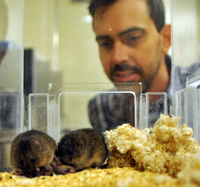 |
Alexander G. Ophir, Assistant Professor. Behavioral Neuroendocrinology, Animal Behavior, Cognitive Ecology.
Ph.D. 2004, McMaster University Phone: 405.744.1715 Email: ophir@okstate.edu |
Specific Interests
A central goal of my research is to understand the proximate control of social behavior and the ultimate consequences of these behaviors. Research in my lab utilizes classic field and laboratory techniques in combination with modern molecular tools to examine the roles of specific brain regions in coordinating social recognition and diverse attributes of temperament related to attachment, aggression, and care-giving.
The hormones vasopressin and oxytocin have been repeatedly implicated in development and maintenance of social behavior in an array of mammals, including humans. Prairie voles (Microtus ochrogaster) have emerged as a model to study social behaviors among adult pairs and their young, and these peptide hormones appear to play a central role in many aspects of their behavior. By investigating the roles of oxytocin, vasopressin and their receptors in multiple social domains, I hope to better understand the substrates of social cognition, socio-emotional behavior, mate choice and mating strategies.
Specifically, research in my lab explores existing individual variation in prairie vole field behavior and the underlying mechanisms involved in partner fidelity, territory defense, offspring survival, and alternative reproductive tactics. Using short interfering RNA to silence V1aR gene expression, we seek to identify the causal role of V1aR on monogamous behavior and social recognition in both the field and lab. We also aim to understand the influence of V1aR on paternal behavior and the developmental consequences on offspring of fathers with V1aR silencing.
Students interested in joining my lab should visit my lab webpage.
Selected Publications
- Ophir AG (2011) Towards meeting Tinbergen’s challenge. Hormones and Behavior. 60, 22-27.
- Ophir AG, Schrader SB, Gillooly JF (2010) Energetic cost of calling: General constraints and species-specific differences. Journal of Evolutionary Biology. 23, 1564-1569.
- Gillooly JF & Ophir AG (2010) The energetic basis of acoustic communication. Proceedings of the Royal Society B: Biological Sciences. 277, 1325-1331
- Ophir AG, Zheng D-J, Eans S & Phelps SM (2009) Social investigation in a memory task relates to neural variation in oxytocin receptor but not vasopressin receptor 1a. Behavioral Neuroscience. 123, 979-991.
- Phelps SM & Ophir AG (2009) Monogamous brains and alternative tactics: Neuronal V1aR, space use and sexual infidelity among male prairie voles. In Cognitive Ecology II. (eds: Dukas R & Ratcliffe JM) Chicago: University of Chicago Press.
- Ophir AG, Campbell P, Hanna K & Phelps SM (2008). A field test of functional microsatellite polymorphism: Allele length relates to neuronal gene expression, but not behavior. Hormones and Behavior. 54, 694-702. [1st authorship is shared with Campbell]
- Ophir AG, Wolff JO & Phelps SM (2008) Variation in neural V1aR predicts sexual fidelity and space use among prairie voles in semi-natural settings. Proceedings of the National Academy of Sciences, USA. 105, 1249-1254.
- Ophir AG, Phelps SM, Sorin AB & Wolff JO (2008) Social but not genetic monogamy is associated with greater breeding success in prairie voles. Animal Behaviour. 75, 1143-1154.
